重音 停顿 节奏 语调
朗读技巧—停连重音语气

朗读技巧—停连重音语气朗读是一种有效传达信息和表达情感的方式之一,能够吸引听众,并让文字更加生动有趣。
为了提高朗读的质量和效果,以下是一些朗读技巧:停顿、重音和语气。
1.停顿停顿是朗读中非常重要的一部分,可以帮助你控制节奏,让听众更好地理解你的意思。
停顿有不同的类型和用途:-自然停顿:在句子的适当位置停顿一下,这样可以给听众一点时间理解所听内容。
一般来说,在逗号、句号和段落结束处停顿是必要的。
-意义停顿:在强调一些词或短语时,可以在其前后停顿,以突出重点。
通过合理运用停顿,可以使句子更加流畅和易于理解。
2.重音重音是指在朗读过程中强调一些词或短语,以突出其重要性或引起听众的注意。
重音有以下几种类型:- 词内重音:将重音放在一个单词内的一些音节上,通常在名词、动词和形容词中使用。
比如,"photoGRAPHY"、"proDUCE"和"beauTIFUL"。
- 词间重音:将重音放在一个句子中不同的单词或短语上,以强调它们之间的关系。
比如,"I didn't say he stole my MONEY",可以通过重音来强调不同的词汇,表达不同的含义和语气。
合理使用重音可以增加朗读的表现力和吸引力。
3.语气语气是指朗读时候表现出的情感和态度。
通过改变语气,可以更好地传达文章的意思和引起听众的共鸣。
以下是一些常见的语气:-愉快的语气:用于朗读欢乐、搞笑或轻松的内容,通过较高的音调和快节奏来表达快乐。
-悲伤的语气:用于朗读悲伤、悲惨或伤心的内容,通过较低的音调和缓慢的节奏来表达悲伤。
-惊讶的语气:用于朗读惊讶、震惊或紧张的内容,通过突然的变化、强烈的语调和停顿来表达惊讶。
使用适当的语气可以让听众更好地理解你的朗读内容,并产生共鸣。
总而言之,通过合理运用停顿、重音和语气等朗读技巧,可以提高朗读的质量和效果。
这些技巧可以帮助你更好地理解和传达所读内容,吸引听众,并增加传递信息和表达情感的能力。
最全英语口语连读、断句、重音、语调等规则(附示范视频)
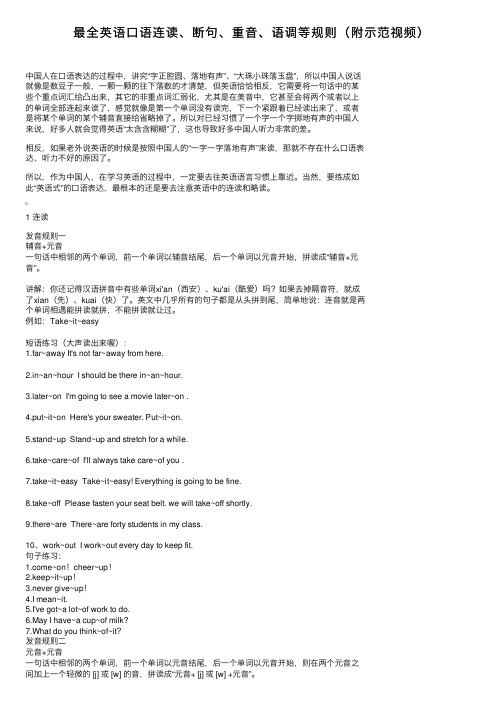
最全英语⼝语连读、断句、重⾳、语调等规则(附⽰范视频)中国⼈在⼝语表达的过程中,讲究“字正腔圆、落地有声”、“⼤珠⼩珠落⽟盘”,所以中国⼈说话就像是数⾖⼦⼀般,⼀颗⼀颗的往下落数的才清楚,但英语恰恰相反,它需要将⼀句话中的某些个重点词汇给凸出来,其它的⾮重点词汇弱化,尤其是在美⾳中,它甚⾄会将两个或者以上的单词全部连起来读了,感觉就像是第⼀个单词没有读完,下⼀个紧跟着已经读出来了,或者是将某个单词的某个辅⾳直接给省略掉了。
所以对已经习惯了⼀个字⼀个字掷地有声的中国⼈来说,好多⼈就会觉得英语“太含含糊糊”了,这也导致好多中国⼈听⼒⾮常的差。
相反,如果⽼外说英语的时候是按照中国⼈的“⼀字⼀字落地有声”来读,那就不存在什么⼝语表达、听⼒不好的原因了。
所以,作为中国⼈,在学习英语的过程中,⼀定要去往英语语⾔习惯上靠近。
当然,要练成如此“英语式”的⼝语表达,最根本的还是要去注意英语中的连读和略读。
1 连读发⾳规则⼀辅⾳+元⾳⼀句话中相邻的两个单词,前⼀个单词以辅⾳结尾,后⼀个单词以元⾳开始,拼读成“辅⾳+元⾳”。
讲解:你还记得汉语拼⾳中有些单词xi'an(西安)、ku'ai(酷爱)吗?如果去掉隔⾳符,就成了xian(先)、kuai(快)了。
英⽂中⼏乎所有的句⼦都是从头拼到尾,简单地说:连⾳就是两个单词相遇能拼读就拼,不能拼读就让过。
例如:Take~it~easy短语练习(⼤声读出来喔):1.far~away It's not far~away from here.2.in~an~hour I should be there in~an~hour.ter~on I'm going to see a movie later~on .4.put~it~on Here's your sweater. Put~it~on.5.stand~up Stand~up and stretch for a while.6.take~care~of I'll always take care~of you .7.take~it~easy Take~it~easy! Everything is going to be fine.8.take~off Please fasten your seat belt. we will take~off shortly.9.there~are There~are forty students in my class.10、work~out I work~out every day to keep fit.句⼦练习:e~on!cheer~up!2.keep~it~up!3.never give~up!4.I mean~it.5.I've got~a lot~of work to do.6.May I have~a cup~of milk?7.What do you think~of~it?发⾳规则⼆元⾳+元⾳⼀句话中相邻的两个单词,前⼀个单词以元⾳结尾,后⼀个单词以元⾳开始,则在两个元⾳之间加上⼀个轻微的 [j] 或 [w] 的⾳,拼读成“元⾳+ [j] 或 [w] +元⾳”。
诗歌朗诵的技巧有哪些
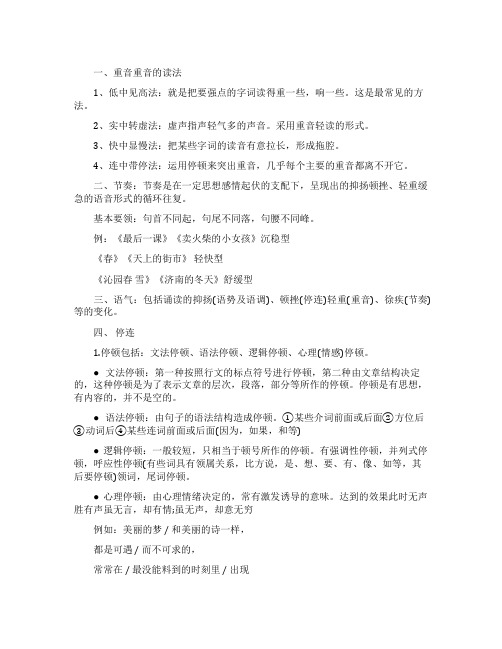
一、重音重音的读法1、低中见高法:就是把要强点的字词读得重一些,响一些。
这是最常见的方法。
2、实中转虚法:虚声指声轻气多的声音。
采用重音轻读的形式。
3、快中显慢法:把某些字词的读音有意拉长,形成拖腔。
4、连中带停法:运用停顿来突出重音,几乎每个主要的重音都离不开它。
二、节奏:节奏是在一定思想感情起伏的支配下,呈现出的抑扬顿挫、轻重缓急的语音形式的循环往复。
基本要领:句首不同起,句尾不同落,句腰不同峰。
例:《最后一课》《卖火柴的小女孩》沉稳型《春》《天上的街市》轻快型《沁园春雪》《济南的冬天》舒缓型三、语气:包括诵读的抑扬(语势及语调)、顿挫(停连)轻重(重音)、徐疾(节奏)等的变化。
四、停连1.停顿包括:文法停顿、语法停顿、逻辑停顿、心理(情感)停顿。
●文法停顿:第一种按照行文的标点符号进行停顿,第二种由文章结构决定的,这种停顿是为了表示文章的层次,段落,部分等所作的停顿。
停顿是有思想,有内容的,并不是空的。
●语法停顿:由句子的语法结构造成停顿。
①某些介词前面或后面②方位后③动词后④某些连词前面或后面(因为,如果,和等)●逻辑停顿:一般较短,只相当于顿号所作的停顿。
有强调性停顿,并列式停顿,呼应性停顿(有些词具有领属关系,比方说,是、想、要、有、像、如等,其后要停顿)领词,尾词停顿。
●心理停顿:由心理情绪决定的,常有激发诱导的意味。
达到的效果此时无声胜有声虽无言,却有情;虽无声,却意无穷例如:美丽的梦 / 和美丽的诗一样,都是可遇 / 而不可求的,常常在 / 最没能料到的时刻里 / 出现席慕容《初相遇》2、与停顿相反的一对观念连贯(用~表示)朗诵过程中,思想情感一直处于积极的运动状态,在意思延续或激情澎湃的地方,必须一气呵成,这就需要用语流连贯的表达。
例如:你的伤痕累累的乳房喂养了迷惘的我、~深思的我、~沸腾的我――舒婷《祖国啊,我亲爱的祖国》。
英语发音的重音、停顿、节奏、语调

为什么我的英语不自然?“I got every sound exact and correct, but still, it doesn’t sound right….”If that is the problem, then this lecture might hopefully be a solution.主要内容l一、语句重音l二、停顿、意群、气群l三、英语中的节奏l四、英语语调一、语句重音l语句重音指的是人们在朗读连贯的语句时,哪些词要重读哪些词不要重读的规则。
l一般规则–重读–不重读l注意一般规则(一):哪些词重读l在连贯的语句中通常需要重读的词有:1.名词、2.形容词、3.数词、4.实义动词、5.副词、6.某些代词(指示代词等)、7.疑问词、8.叹词。
l这条规则可以总结为:实词重读1.名词nounl An elephant is an animal. l I’m a teacher.2.形容词adjectivel She’s beautiful.l Her skirt is blue and white.3.数词numerall I have two brothers. l John is nine.4.实义动词notional verbl She sings well.l Mary loves her dolls.5.副词adverbl He speaks English slowly and carefully.6.某些代词(指示代词等)pronounl1. 指示代词this, that, these, thosel That boy over there is my cousin.l2. 反身代词myself, yourself, themselves…. l He himself hurt his own foot.l3. 不定代词some, every, all, both, none, other, many, few, somebody, something…. l Everybody was late.l Some are red; some are blue.7.疑问词l1.疑问代词what, which, who, whom, whose l What would you like to eat?l2.疑问副词when, where, howl When did you get there?8.叹词(interjection)l Oh, it’s snowing.l My, what a downpour!l Hey, that’s a nice shot!l Dear me!一般规则(二):哪些词不重读l在连贯的语句中通常不重读的词有:l1. 冠词、2. 代词(人称、物主、关系代词)、3. 非实义动词、4.连词、5.介词。
朗诵技巧之语调重音停顿语速句调方法要领提示指导

朗诵技巧之语调重音停顿语速句调方法要领提示指导朗诵技巧是指在表演朗诵时运用的一些技巧和方法,目的是通过声音的处理来更好地表达文意和情感。
以下是关于语调、重音、停顿、语速和句调的一些要领提示和指导:1.语调:语调是朗诵中表达情感和意思的重要手段。
可以通过高低变化、升降调等方法来调整语音的音调。
在适当的地方使用上升调可以增加句子的神秘感和吸引力,而下降调则可以强调句子的决断力和确定性。
2.重音:重音对于朗诵的节奏和节拍非常重要。
在每个句子中,选择一个或多个重音词来突出重要的词或词组。
重音部分应该加强语气和表达,注意将重音音节发声清晰有力,同时调整其他音节的音量和语调,使之与重音形成对比。
3.停顿:停顿是朗诵中划分语义和呼吸的重要方式。
在适当的地方使用停顿可以使句子更加流畅和易于理解。
停顿的位置应该考虑到句子的结构和意思,以及自然语言的语法规则。
在停顿时,可以适当延长音节的时间来给听众留出反应和理解的空间。
4.语速:语速是指朗诵的快慢程度。
适当的语速可以使听众更好地理解和感受文意和情感。
根据朗诵的内容和目的,可以选择快速朗诵来表达紧迫感和激情,或者选择缓慢朗诵来表达深思和内省。
5.句调:句调是指句子的整体音调和语音腔调。
在朗诵中,可以通过合适的句调来表达句子的结构和情感。
一般而言,陈述句的句调下降,疑问句的句调上升,感叹句则可以适度上扬。
合理运用句调可以凸显句子的重要信息和情感色彩。
总而言之,朗诵技巧是通过语调、重音、停顿、语速和句调等方式来提升朗诵效果的方法。
在实践中,要根据具体的朗诵内容和目的来选择和运用这些技巧,同时注重呼吸和自然表达,以便更好地与听众进行沟通和共鸣。
朗诵技巧之语调、重音、停顿、语速、句调方法要领提示指导
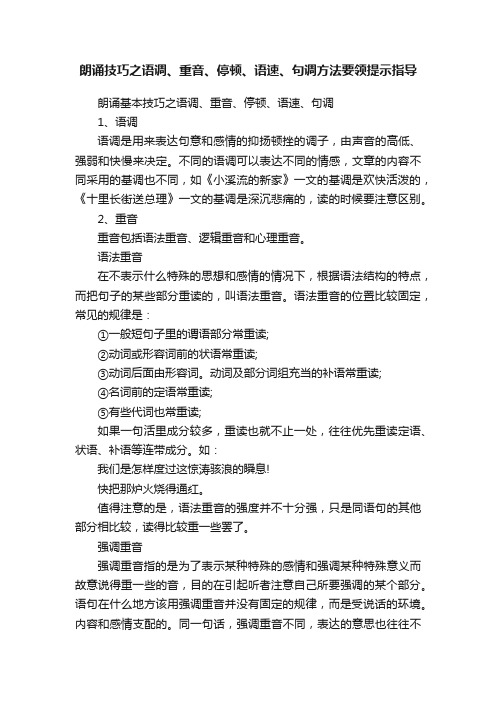
朗诵技巧之语调、重音、停顿、语速、句调方法要领提示指导朗诵基本技巧之语调、重音、停顿、语速、句调1、语调语调是用来表达句意和感情的抑扬顿挫的调子,由声音的高低、强弱和快慢来决定。
不同的语调可以表达不同的情感,文章的内容不同采用的基调也不同,如《小溪流的新家》一文的基调是欢快活泼的,《十里长街送总理》一文的基调是深沉悲痛的,读的时候要注意区别。
2、重音重音包括语法重音、逻辑重音和心理重音。
语法重音在不表示什么特殊的思想和感情的情况下,根据语法结构的特点,而把句子的某些部分重读的,叫语法重音。
语法重音的位置比较固定,常见的规律是:①一般短句子里的谓语部分常重读;②动词或形容词前的状语常重读;③动词后面由形容词。
动词及部分词组充当的补语常重读;④名词前的定语常重读;⑤有些代词也常重读;如果一句活里成分较多,重读也就不止一处,往往优先重读定语、状语、补语等连带成分。
如:我们是怎样度过这惊涛骇浪的瞬息!快把那炉火烧得通红。
值得注意的是,语法重音的强度并不十分强,只是同语句的其他部分相比较,读得比较重一些罢了。
强调重音强调重音指的是为了表示某种特殊的感情和强调某种特殊意义而故意说得重一些的音,目的在引起听者注意自己所要强调的某个部分。
语句在什么地方该用强调重音并没有固定的规律,而是受说话的环境。
内容和感情支配的。
同一句话,强调重音不同,表达的意思也往往不同,例如:我去过上海。
(回答“谁去过上海”)我去过上海。
(回答“你去没去过上海”)我去过上海。
(回答“北京、上海等地,你去过哪儿?”)因而,在朗诵时,首先要认真钻研作品,正确理解作者意图,才能较快较准地找到强调重音之所在。
3、停顿停顿有语法停顿、心理停顿、逻辑停顿。
生理停顿生理停顿即朗诵者根据气息需要,在不影响语义完整的地方作一个短暂的停歇。
要注意,生理停顿,不要妨碍语意表达,不割裂语法结构;语法停顿语法停顿是反映一句话里面的语法关系的,在书面语言里就反映为标点。
2024年中考备考之朗读设计——重音 停连 语气 语调 节奏 原卷版

2024年中考备考之朗读设计——重音停连语气语调节奏表情朗读符号一停连(一)什么叫停连?停连是指在有声语言的流动过程中声音的中断和连续。
语音上的间歇叫停顿;不中断的地方叫连接。
[停连]停顿,用“∨”标示在词语之间的上方,不限标点处,句中有时也有小停顿;连接,用“∧”标示在词语之间的上方,标明是为了表达的需要,在此处要一口气连贯地读下来,有标点也不停顿。
(二)什么时候需要停连?停连有时是朗读者为调节气息的需要,有时是句子结构上的需要,有时是朗读者为表达思想感情的需要,有时为了满足听者思考、理解和接受也是需要停连的。
(1)盼望..着,东风∨来.了,∧春天的脚步∨近.了。
..着,盼望设计理由:重读“盼望”是为了让读者感受到作者在静静地等待春天来临;重读“来”和“近”是为了表现当春天真的来临时,作者内心的激动、惊喜。
在“来了”“近了”前面停顿,是为了让读者感受到春天来临是有一个过程的。
(2)盼望..着,东风∧来.了,∧春天的脚步∨近.了。
..着,盼望设计理由:“东风来了”要连读,不应该停顿,这样更能体现出作者内心激动的心情。
(3)山尖∨全.白了,给蓝天镶.上一道银边。
山坡上∨有的地方雪厚.点儿,有的地方∨草色还露.着;这样,一道儿白.,∧一道儿暗黄..,给山们∨穿.上一件带水纹的花衣..;看着看着,这件花衣好像被风儿吹动,∧叫你希望看见一点儿∨更美..。
等到快日落的时..的∨山.的肌肤候,微黄..。
..害了羞,微微露.出点儿粉色..的阳光∨斜射..在山腰上,那点儿薄雪∨好像忽然设计理由:“镶”“露”“穿”“斜射”等动词重读,增添了动感,透露出薄雪和小山的灵气;“白色”“暗黄”“微黄”“粉色”等词语渲染出一个暖色调的冬天,重读这些词语,将语词间透露出的作者的愉悦心情表达出来;“花衣”“肌肤”是作者巧妙的联想,表达了对济南发自内心的热爱,重读这些词,要带有欣赏和喜爱的语气。
提示:重音和停连的设计可以有所不同,设计是建立在读者对文本的情感把握之上。
朗读技巧—停连、重音、语气

语气
〔二〕气息与感情、声音相辅相成,互相制约 气息是表现思想感情的重要手段。朗读的感情、气息和声音之间的关系是相辅 相成、互相制约的。在朗读中,要将情、气、声三者融为一体,自如运用,增加声 音的表现力。 张颂先生概括其为: “爱〞——气徐声柔;“憎〞——气促声硬; “悲〞——气沉声缓;“喜〞——气满升高; “惧〞——气提声凝;“欲〞——气多声放; “急〞——气短声促;“冷〞——气少声平; “怒〞——气粗声重;“疑〞——气细声黏。
停连的分类
〔5〕凸显性停连 为了突出句中某些重要词语,引起听众的注意,加深听众的印象,可以在这些词语的前面或后 面稍加停顿。
〔6〕生理性停连 用于情感的强烈运动而形成的语流声音的中断。
停连的规律
P121。技能训练
朗读技巧训练
02 重音
朗读者在表达时,为了使听众能迅速准确地把握作品的内容和思想感情,常常要强调那些 起重要作用的词或短语,这就是重音。
P117例如-不同停连会带来不同的表达效果。
停连的分类
1、语法停连。 由语言的结构形式决定的语流声音的中断和延续。 〔1〕利用语法停连展现作品的结构层次。 根据文章内容,在标题,段落,层次间进行适当停留。
〔2〕参考标点符号揭示句子间的关系。 句号。问号?感慨号!>分号;>逗号,>顿号、〔例:?可爱的小鸟?〕 有时没有标点却要停顿,有标点却不停顿。
演讲与口才能力训练(停顿、重音、语速、语调)

演讲与口才能力训练(停顿、重音、语速、语调)听课、听课、听课,有的人说话语调平缓,整体节奏一致,让人昏昏欲睡。
而有些人,说起来,抑扬顿挫,听起来令人振奋。
只要在说话的过程中注意停顿、重音、语速、语调,前者就不会有问题。
所以你的演讲结束后,要设计好停顿、重音、语速、语调,并根据设计好的要点做必要的练习,然后再演讲。
这个讲座的内容不需要先练习,只需要吸引注意力。
一、停顿演讲的时候,有些句子很短,根据写好的标点符号停顿一下就行了。
有些句子又长又复杂。
虽然句子中没有标点符号,但是为了把意思表达清楚,你也可以做一些短暂的停顿。
但如果停顿不当,就会破坏句子的结构,影响语义的正确传递。
正确的停顿有几种类型:1.标点符号停顿。
标点符号是书面语言的停顿符号,也是演讲作品时语言停顿的重要依据。
标点符号的停顿规律一般是:句号、问号、感叹号、省略号停顿略长于分号、破折号、连接号;分号、破折号、连接号的停顿时间又长于逗号、冒号;逗号、冒号的停顿时间又长于顿号、间隔号。
另外,在作品上的段落之间,停顿的时间要比一般的句号时间长些。
以上停顿,也不是绝对的。
有时为表达感情的需要,在没有标点的地方也可以停顿,在有标点的地方也可以不停顿。
2.语法停顿。
语法停顿是句子中间的自然停顿。
它往往是为了强调、突出句子中主语、谓语、宾语、定语、状语或补语而做的短暂停顿。
学习语法有助于我们在演讲中正确地停顿断句,正确地表达出你要表达的思想内容。
3.感情停顿。
感情停顿不受书面标点和句子语法关系的制约,完全是根据感情或心理的需要而作的停顿处理,它受感情支配,根据感情的需要决定停与不停。
它的特点是声断而情不断,也就是声断情连。
二、重音重音是指言语中对表达和表达起重要作用的词、词或短语应该强调的技巧。
重音通过对声音的强调来强调意思,可以给色彩鲜明的词增加重量。
压力有以下几种情况:1.语法重音。
语法重音是按语言习惯自然重读的音节。
这些重读的音节大都是按照平时的语言规律确定的。
诗歌朗诵的技巧有哪些

诗歌朗诵的技巧有哪些一、重音重音的读法1、低中见高法:就是把要强点的字词读得重一些,响一些。
这是最常见的方法。
2、实中转虚法:虚声指声轻气多的声音。
采用重音轻读的形式。
3、快中显慢法:把某些字词的读音有意拉长,形成拖腔。
4、连中带停法:运用停顿来突出重音,几乎每个主要的重音都离不开它。
二、节奏:节奏是在一定感情起伏的支配下,呈现出的抑扬顿挫、轻重缓急的语音形式的循环往复。
基本要领:句首不同起,句尾不同落,句腰不同峰。
例:《最后一课》《卖火柴的小女孩》沉稳型《春》《天上的街市》轻快型《沁园春雪》《济南的冬天》舒缓型三、语气:包括诵读的抑扬(语势及语调)、顿挫(停连)轻重(重音)、徐疾(节奏)等的变化。
四、停连1.停顿包括:文法停顿、语法停顿、逻辑停顿、心理(情感)停顿。
●文法停顿:第一种按照行文的标点符号进行停顿,第二种由文章结构决定的,这种停顿是为了表示文章的层次,段落,部分等所作的停顿。
停顿是有思想,有内容的,并不是空的。
●语法停顿:由句子的语法结构造成停顿。
①某些介词前面或后面②方位后③动词后④某些连词前面或后面(因为,如果,和等)●逻辑停顿:一般较短,只相当于顿号所作的停顿。
有强调性停顿,并列式停顿,呼应性停顿(有些词具有领属关系,比方说,是、想、要、有、像、如等,其后要停顿)领词,尾词停顿。
●心理停顿:由心理情绪决定的,常有激发诱导的意味。
达到的效果此时无声胜有声虽无言,却有情;虽无声,却意无穷例如:美丽的梦/和美丽的诗一样,都是可遇/而不可求的,常常在/最没能料到的时刻里/出现席慕容《初相遇》2、与停顿相反的一对观念连贯(用~表示)朗诵过程中,思想情感一直处于积极的运动状态,在意思延续或激情澎湃的地方,必须一气呵成,这就需要用语流连贯的表达技巧。
例如:你的伤痕累累的乳房喂养了迷惘的我、~深思的我、~沸腾的我――舒婷《祖国啊,我亲爱的祖国》。
朗读技巧之重音停连语速语调语气节奏要领方法指导
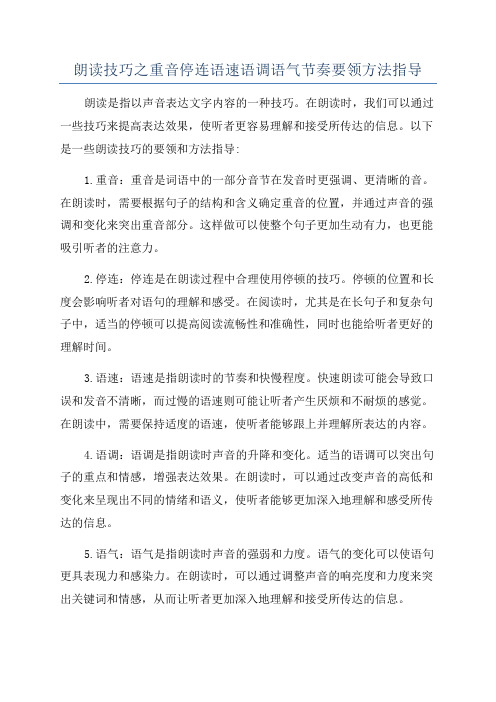
朗读技巧之重音停连语速语调语气节奏要领方法指导朗读是指以声音表达文字内容的一种技巧。
在朗读时,我们可以通过一些技巧来提高表达效果,使听者更容易理解和接受所传达的信息。
以下是一些朗读技巧的要领和方法指导:1.重音:重音是词语中的一部分音节在发音时更强调、更清晰的音。
在朗读时,需要根据句子的结构和含义确定重音的位置,并通过声音的强调和变化来突出重音部分。
这样做可以使整个句子更加生动有力,也更能吸引听者的注意力。
2.停连:停连是在朗读过程中合理使用停顿的技巧。
停顿的位置和长度会影响听者对语句的理解和感受。
在阅读时,尤其是在长句子和复杂句子中,适当的停顿可以提高阅读流畅性和准确性,同时也能给听者更好的理解时间。
3.语速:语速是指朗读时的节奏和快慢程度。
快速朗读可能会导致口误和发音不清晰,而过慢的语速则可能让听者产生厌烦和不耐烦的感觉。
在朗读中,需要保持适度的语速,使听者能够跟上并理解所表达的内容。
4.语调:语调是指朗读时声音的升降和变化。
适当的语调可以突出句子的重点和情感,增强表达效果。
在朗读时,可以通过改变声音的高低和变化来呈现出不同的情绪和语义,使听者能够更加深入地理解和感受所传达的信息。
5.语气:语气是指朗读时声音的强弱和力度。
语气的变化可以使语句更具表现力和感染力。
在朗读时,可以通过调整声音的响亮度和力度来突出关键词和情感,从而让听者更加深入地理解和接受所传达的信息。
6.节奏:节奏是指朗读中的音与音之间的间隔和距离。
适当的节奏可以使语句更加流畅和自然,同时也可以加强听者对所表达内容的注意力和理解。
在朗读过程中,需要注意调整音节和词语之间的时间间隔和音调变化,使整个句子的节奏感更加明显和舒适。
综上所述,朗读是一种能够更好地表达和传达文字内容的技巧。
在朗读时,我们可以通过使用重音、停连、调节语速、语调、语气和节奏等技巧来提高表达效果,并使听者更容易理解和接受所传达的信息。
通过不断的练习和调整,我们可以逐渐掌握这些朗读技巧,并将其应用到实际的朗读中。
高中高考听力中的重音 语调 节奏 停顿 连读 爆破 同化的例子
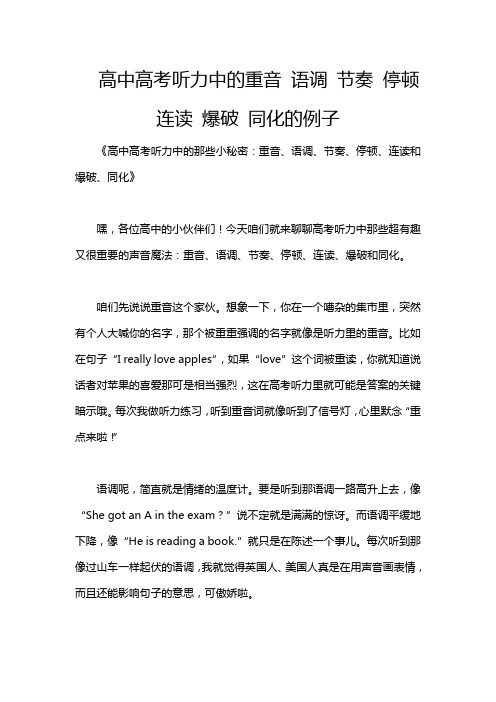
高中高考听力中的重音语调节奏停顿连读爆破同化的例子《高中高考听力中的那些小秘密:重音、语调、节奏、停顿、连读和爆破、同化》嘿,各位高中的小伙伴们!今天咱们就来聊聊高考听力中那些超有趣又很重要的声音魔法:重音、语调、节奏、停顿、连读、爆破和同化。
咱们先说说重音这个家伙。
想象一下,你在一个嘈杂的集市里,突然有个人大喊你的名字,那个被重重强调的名字就像是听力里的重音。
比如在句子“I really love apples”,如果“love”这个词被重读,你就知道说话者对苹果的喜爱那可是相当强烈,这在高考听力里就可能是答案的关键暗示哦。
每次我做听力练习,听到重音词就像听到了信号灯,心里默念“重点来啦!”语调呢,简直就是情绪的温度计。
要是听到那语调一路高升上去,像“She got an A in the exam?”说不定就是满满的惊讶。
而语调平缓地下降,像“He is reading a book.”就只是在陈述一个事儿。
每次听到那像过山车一样起伏的语调,我就觉得英国人、美国人真是在用声音画表情,而且还能影响句子的意思,可傲娇啦。
节奏就像是歌曲里的鼓点。
稳重的节奏,就像老师讲课一样有条不紊,你能轻松跟上。
但有时候听力里节奏突然加快,就像有人在你耳边“哒哒哒”地捣鼓,那时候就必须集中十二分的精力了。
我就感觉像是和一个声音在赛跑,要是跟丢了节奏,那可就惨咯。
停顿这个小小的间隙可别小看它。
就像喜剧演员抖包袱之前的那一秒寂静。
比如说,“I'm going to... the library tomorrow.”这中间的停顿,也许后面就会有校正或者补充,这个时候竖起耳朵准没错。
连读就像是两个好朋友手拉手,例如“not at all”读成“no ta tall”,第一次听到的时候简直懵圈,就像他们在搞什么声音的小魔术。
但是习惯之后就发现连读就像是英语世界里的一种独特握手暗号。
爆破就有点酷了。
本来像“big cat”里的“g”应该发音,但是轻轻一爆,这个音就像被隐藏了,变成“bi' cat”,感觉就像声音玩了个小小消失术。
朗读技巧之重音、停连、语速、语调、语气、节奏要领方法指导

朗读基本技巧之重音、停连、语速、语调、语气、节奏所谓朗读的技巧,正是指朗读者为了准确地理解和传达作品的思想内容和感情而对有声语言所进行的设计和处理,是一种具有创造性的语言活动。
这些设计和处理是从作品内容出发的,技巧运用要经过两个阶段:其一,学习阶段——“刻意雕琢”阶段;其二,熟练阶段——“回归自然”。
不经过“刻意雕琢”,就不能“回归自然”,因为不敢雕琢,就永远不会雕琢,不学习技巧,就永远不能掌握技巧,也只好停留在自然状态中长期“自然”下去。
下面从重音、停连、语速、语调、语气、节奏等方面讲一讲朗读的基本技巧。
1.重音——朗读中画龙点睛的一笔。
如何表达重音呢?在确定了重音后,我们就要运用恰当的声音把重音表达出来。
提到重音的表达,人们往往理解为加重读。
其实,这是不够准确的。
如果各种重音都用使劲念、大声读的方法加以突出,不但不能突出重音,也显得单调。
下面,介绍几种常用的重音表达方法:(1)加强音量就是把确定为重音的音节读得重一些、强一些,而把非重音音节读得轻一些、弱一些。
读重音,唇舌要用力;读非重音,唇舌可以稍松弛。
这样可以在强弱的对比中突出重音。
(2)增加音高就是把确定为重音的音节的读音提高一些,而把非重读音节的读音降低一些。
具体来说,在读重读音节时,发音部位推前,声带拉紧;非重读音节,发音部位靠后,声带稍松。
通过声音的高低对比突出重音。
(3)增加音长(4)重音轻读(5)语法重音一般短语的谓语重,动宾结构的宾语重,定语状语和补语重,疑问和指示代词重,列举的并列词语重,比喻句中的喻体重,轻声音节的头音重,人名地名的尾音重。
(6)逻辑重音朗读重音可以任意转移,但一定要符合语言逻辑绝对不能前言不搭后语。
必须前后呼应才有道理。
语法重音服从逻辑重音,是因为语言环境有差异,逻辑重音要标上着重号,以便于正确地体现语意。
2.停连——朗读中的标点符号这里的“停”,指的是停顿;“连”,指的是连接。
这里我们先谈谈句中的停连。
英语的节奏重音和和语调
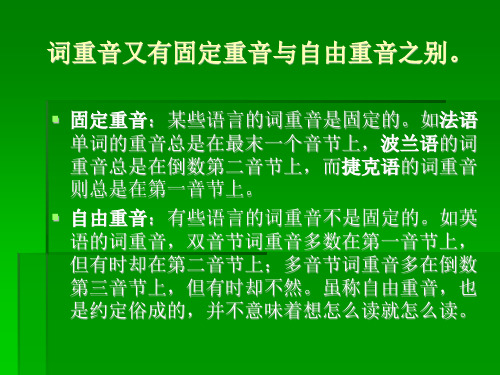
▪ 固定重音:某些语言的词重音是固定的。如法语 单词的重音总是在最末一个音节上,波兰语的词 重音总是在倒数第二音节上,而捷克语的词重音 则总是在第一音节上。
▪ 自由重音:有些语言的词重音不是固定的。如英 语的词重音,双音节词重音多数在第一音节上, 但有时却在第二音节上;多音节词重音多在倒数 第三音节上,但有时却不然。虽称自由重音,也 是约定俗成的,并不意味着想怎么读就怎么读。
句重音
▪ 句重音是指在语流中受句意、节奏、 修辞等因素影响,有的词重音失去了,有 的词重音保留下来了,那保留下来的词重 音就是句重音。实词(名词、形容词、数 词、实义动词、副词、感叹词等)一般都 有句重音。虚词(冠词、介词、连接词等) 通常没有句重音。助动词、情态动词在句 尾有句重音,在句首可有可无,在句中则 没有句重音。
▪ ▪ 2. The great wealth of English literature/
makes it impossible/ to deal with this subject/ in any detail/ within the scope/ of one short lesson.
关于语调
语调组 Tune 2 plus Tune 1
▪ When he came, I asked him to wait. ▪ After the game, we had some tea. ▪ When he saw us, he ran away. ▪ If you like, I’ll send the car for you. ▪ In spite of the rain, they all came as they ▪ promised. ▪ After all I had done for my children, they ▪ simply went and left me.
朗读指导中的重音、停顿、语速、语气、语调
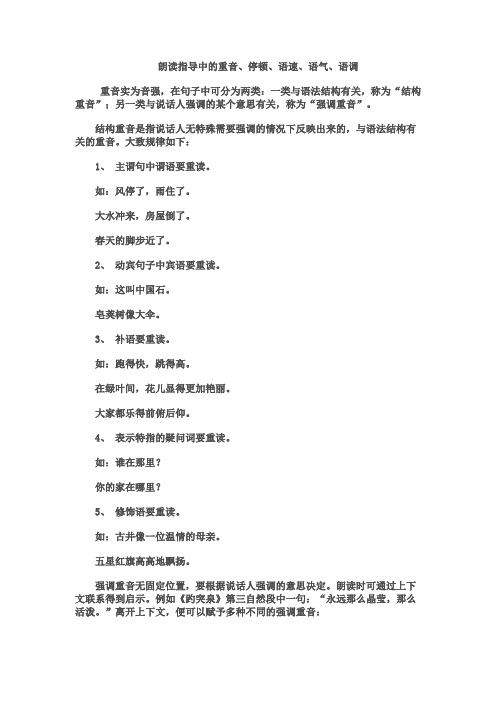
朗读指导中的重音、停顿、语速、语气、语调重音实为音强,在句子中可分为两类:一类与语法结构有关,称为“结构重音”;另一类与说话人强调的某个意思有关,称为“强调重音”。
结构重音是指说话人无特殊需要强调的情况下反映出来的,与语法结构有关的重音。
大致规律如下:1、主谓句中谓语要重读。
如:风停了,雨住了。
大水冲来,房屋倒了。
春天的脚步近了。
2、动宾句子中宾语要重读。
如:这叫中国石。
皂荚树像大伞。
3、补语要重读。
如:跑得快,跳得高。
在绿叶间,花儿显得更加艳丽。
大家都乐得前俯后仰。
4、表示特指的疑问词要重读。
如:谁在那里?你的家在哪里?5、修饰语要重读。
如:古井像一位温情的母亲。
五星红旗高高地飘扬。
强调重音无固定位置,要根据说话人强调的意思决定。
朗读时可通过上下文联系得到启示。
例如《趵突泉》第三自然段中一句:“永远那么晶莹,那么活泼。
”离开上下文,便可以赋予多种不同的强调重音:永远那么晶莹,那么活泼。
(强调水流的欢快不是吗?)永远那么晶莹,那么活泼。
(强调就是那样的。
)永远那么晶莹,那么活泼。
(强调水花的透明与闪亮。
)永远那么晶莹,那么活泼。
(强调总是那样。
)但是,联系上下文,稍作思考就会知道,应是第四种情况,重音在“永远”上,这样才能与上文的“没昼没夜”,下文的“永远……不知疲倦”相照应,充分表现原文的思想感情。
除此之外,强调重音切忌割裂句子。
往往在把句子分段之后会产生片面性。
例如“人们存心要干凶恶残酷的坏事情,那是很容易找到借口的。
”这句话如果分段来看,很容易误认为重音在修饰成分“凶恶残酷”或者在宾语“借口”上。
但是纵观全句(假设复句)就不难发现,作者愿意是说明“欲加之罪,何患无辞”,所以很显然,重音应该放在“存心”和“很容易”上。
这样,两个分句才能相互响应,起到相得益彰的作用。
特别是作为故事的结尾,更不可能仍停留在事情的表面而不去提示道理,不是吗?在实际的朗读中,结构重音与强调重音往往并存,相比之下,强调重音更为明显,此时结构重音便要服从强调重音。
朗读的最基本技巧有哪些
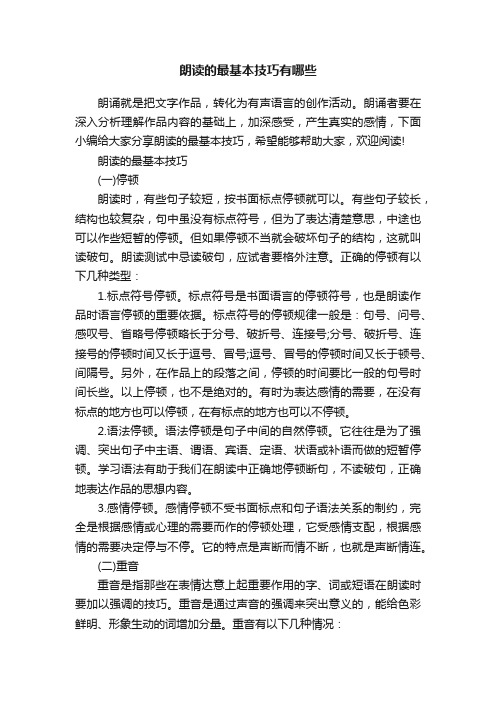
朗读的最基本技巧有哪些朗诵就是把文字作品,转化为有声语言的创作活动。
朗诵者要在深入分析理解作品内容的基础上,加深感受,产生真实的感情,下面小编给大家分享朗读的最基本技巧,希望能够帮助大家,欢迎阅读!朗读的最基本技巧(一)停顿朗读时,有些句子较短,按书面标点停顿就可以。
有些句子较长,结构也较复杂,句中虽没有标点符号,但为了表达清楚意思,中途也可以作些短暂的停顿。
但如果停顿不当就会破坏句子的结构,这就叫读破句。
朗读测试中忌读破句,应试者要格外注意。
正确的停顿有以下几种类型:1.标点符号停顿。
标点符号是书面语言的停顿符号,也是朗读作品时语言停顿的重要依据。
标点符号的停顿规律一般是:句号、问号、感叹号、省略号停顿略长于分号、破折号、连接号;分号、破折号、连接号的停顿时间又长于逗号、冒号;逗号、冒号的停顿时间又长于顿号、间隔号。
另外,在作品上的段落之间,停顿的时间要比一般的句号时间长些。
以上停顿,也不是绝对的。
有时为表达感情的需要,在没有标点的地方也可以停顿,在有标点的地方也可以不停顿。
2.语法停顿。
语法停顿是句子中间的自然停顿。
它往往是为了强调、突出句子中主语、谓语、宾语、定语、状语或补语而做的短暂停顿。
学习语法有助于我们在朗读中正确地停顿断句,不读破句,正确地表达作品的思想内容。
3.感情停顿。
感情停顿不受书面标点和句子语法关系的制约,完全是根据感情或心理的需要而作的停顿处理,它受感情支配,根据感情的需要决定停与不停。
它的特点是声断而情不断,也就是声断情连。
(二)重音重音是指那些在表情达意上起重要作用的字、词或短语在朗读时要加以强调的技巧。
重音是通过声音的强调来突出意义的,能给色彩鲜明、形象生动的词增加分量。
重音有以下几种情况:1.语法重音。
语法重音是按语言习惯自然重读的音节。
这些重读的音节大都是按照平时的语言规律确定的。
一般说,语法重音不带特别强调的色彩。
2.强调重音。
强调重音不受语法制约,它是根据语句所要表达的重点决定的,它受应试者的意愿制约,在句子中的位置上不固定的。
- 1、下载文档前请自行甄别文档内容的完整性,平台不提供额外的编辑、内容补充、找答案等附加服务。
- 2、"仅部分预览"的文档,不可在线预览部分如存在完整性等问题,可反馈申请退款(可完整预览的文档不适用该条件!)。
- 3、如文档侵犯您的权益,请联系客服反馈,我们会尽快为您处理(人工客服工作时间:9:00-18:30)。
人们在说话或朗读时,声音时升时降,时高时 低。这种声音的高低升降与句子重音结合在一 起便构成英语语调。 英语里最基本的语调有两种:降调和升调。
– –
句子末尾用下降语调的叫降调。 句子末尾用上升语调的叫升调。
降、升调的三个共同点
• • • •
1. 句子中第一个重读音节的声调最高。 Both the ildren are playing outside. Both the child ren are play ing out ↘side.
1. 冠词
This is a computer. The computer is my sisters.
2. 代词(人称、物主、关系代词)
I am a teacher. They are my friends. My mother often helps me. The book that he is reading is mine. Do you remember the girl whom we met at the party?
o o
Come here. Look out! What for? No more. Say “yes”. Ask John.
o oo
Try again. Not enough. Look inside. Do it now. Not so fast. Cut the bread.
二、停顿、意群、气群
为了使意思表达得更清楚,或者为了换气的需 要,人们在说话或朗读的时候,经常需要停顿 (pausing)。 形式上,标点符号提示停顿,而且提示停顿的 长短。逗号、分号、冒号等停顿较短,句号停 顿较长。 意义上,停顿和意群、气群密切相关。
意群
一个句子可以按照意义和语法结构分为几个部 分,每一个部分可以称为一个意群(sense group)。 从语义、语法上来讲,意群是能表达某种意思 的一个词,一组词,一个短语或一个分句,一 个从句或一个主句。 从语调上来说,意群是可以用降调、升调或平 调来朗读的一个语调单位。
3. 不定代词 some, every, all, both, none, other, many, few, somebody, something…. Everybody was late. Some are red; some are blue.
7.疑问词
1.疑问代词 what, which, who, whom, whose What would you like to eat? 2.疑问副词 when, where, how When did you get there?
三、英语中的节奏
先看例子:She studies every morning. She stu dies eve ry mor ning. 在朗读时,重读音节要念得重些,长些,慢些(因而 显得特别响亮清楚);非重读音节则要念得轻些、短 些、快些(因而显得不是那么响亮清楚)。
这种自然形成的轻重、长短、快慢等有规律的 交替就构成英语里的基本节奏。
He put the letter into the envelope↘, /smoked a cigarette ↘/and then walked out of his room. ↘ When she learned that, ↗ /she was very angry↘/ and decided to punish the man. ↘
A: I thought you were a student. B: I am a student. ….and that government of the people, by the people, for the people, shall not perish from the earth.
o ooo
Send him away. Terribly slow. Give him a book What is the time? Sing us a song. Throw it away.
o
o ooo
I’ve eaten them all. He wanted us to. I know what it is. He gave it to me. We had to do it.
o
o oo o oo
He started to talk to me. She wanted to write to him. I’ll borrow another one. You’ll get it on Sunday. He came on a bicycle.
四、英语语调
4.实义动词 notional verb
She sings well. Mary loves her dolls.
5.副词 adverb
He speaks English slowly and carefully.
6.某些代词(指示代词等)pronoun
1. 指示代词 this, that, these, those That boy over there is my cousin. 2. 反身代词 myself, yourself, themselves…. He himself hurt his own foot.
气群
凡是一口气能说完或读完的一个句子或句子中 一部分称为一个气群。一个气群一般包含若干 个意群,气长的人可以念完一个很长的句子而 不换气,但最短的气群也不得少于一个意群。
Hurry up! // Take it away. // Both my brothers and I /are fond of music.// Mary and her friend /had a big quarrel.// Which is bigger, //an elephant /or a tiger?//
Before 1949, I used to live in Hong Kong and worked as a teacher.
① Before 1949/, ↗ ②I used to live in Hong Kong/ ↗ ③and worked as a teacher. ↘
意义单位
主要内容
一、 语句重音 二、停顿、意群、气群 三、英语中的节奏 四、英语语调
一、语句重音
语句重音指的是人们在朗读连贯的语句时,哪 些词要重读哪些词不要重读的规则。 一般规则
– –
重读 不重读
注意
一般规则(一):哪些词重读
在连贯的语句中通常需要重读的词有:1.名词、 2.形容词、3.数词、4.实义动词、5.副词、6. 某些代词(指示代词等)、7.疑问词、8.叹词。 这条规则可以总结为:实词重读
1.名词 noun
An elephant is an animal. I’m a teacher.
2.形容词 adjective
She’s beautiful. Her skirt is blue and white.
3.数词 numeral
I have two brothers. John is nine.
3. 非实义动词
John is studying Chinese. The meeting will be cancelled. He may not go to Shanghai tomorrow. I used to go there.
4.连词
and, or, for, but, as, than, if, when, while, since, now (that), as if, as though, etc. I won’t do it, for I don’t think it’s right. Will you stay home or stay with me? He works much harder than you. He came to see me but didn’t stay long.
o
o oooo
I think it will be fine. I wanted you to know. You ought to go to bed. You only have to try. I’ll try to be in time. He didn’t know the way.
一个节奏群
It’s fine. I’m busy. He’s a doctor. There’s a letter for you.
两个节奏群
Go there. I want to go. I wanted to know. I wanted you to know. I wanted you to do it. I wanted you to write to him.
8.叹词(interjection)
Oh, it’s snowing. My, what a downpour! Hey, that’s a nice shot! Dear me!
一般规则(二):哪些词不重读
在连贯的语句中通常不重读的词有: 1. 冠词、2. 代词(人称、物主、关系代词)、 3. 非实义动词、4.连词、5.介词。
语法单位 语调单位
